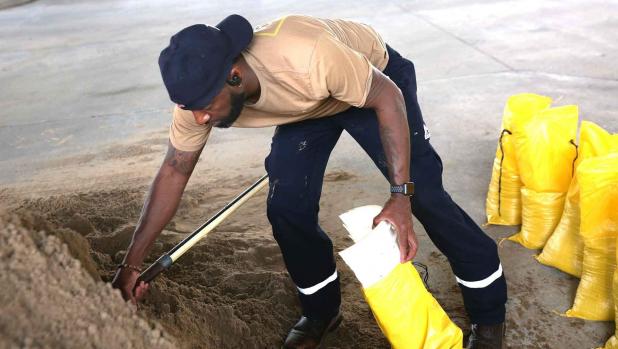
The Daily Review/Bill Decker
David Washington III fills sandbags Wednesday under the bridge near Berwick Town Hall.
From the Editor: First the COVID, then the storms, and finally stress
BERWICK — When last we met David Washington III, it was late August. Washington was under the bridge near Berwick Town Hall, filling sandbags to protect his mother’s home as hurricanes Marco and Laura approached Louisiana.
We got a picture and talked to him for a story about hurricane preparations.
On Wednesday, Washington was back under the bridge, filling yellow bags with sand.
Same place. Different hurricane.
“I’m getting too good at this,” Washington said as he shoveled. “I thought we were done with it. Here we go again.”
By now you’ve probably heard of “COVID fatigue,” the feeling of being overwhelmed by face masks, social distancing, keeping the kids at home and all the rest.
Some of us may be feeling hurricane fatigue.
You know the score. Louisiana has been in one of the National Hurricane Center’s forecast cones six times in this miserable excuse for a year, starting with Hurricane Cristobal on June 1. That was, by the way, the earliest date a third named stormed has ever formed in the Gulf.
It’s been a strange hurricane season in other ways, and not because the center ran out of names and had to start referring to storms by Greek letters.
We had two sets of virtual hurricane twins this year: Laura and Marco in August, and this month Gamma and Delta, the storm currently headed in this direction.
Laura appeared to be headed for Morgan City’s general area at one point. Instead, it veered west and caused widespread damage in Cameron, Calcasieu and points north.
Sally was another close call. That storm took a sharp right and hit the Redneck Riviera.
But, according to some pithy analysis on the Federal Emergency Management Agency website, a hurricane doesn’t have to hit you to hit you where you live.
“Be available for family, friends, and neighbors who may need someone to talk to about their feelings,” FEMA advises. “Many people may already feel fear and anxiety about the coronavirus 2019 (COVID-19). The threat of a hurricane can add additional stress.”
You think?
FEMA directs us to the Centers for Disease Control and Prevention website for information about dealing with a traumatic event.
“Strong emotions like fear, sadness or other symptoms of depression are normal, as long as they are temporary and don’t interfere with daily activities,” says the CDC. “If these emotions last too long or cause other problems, it’s a different story.
“Sometimes stress can be good. It can help you develop skills needed to manage potentially threatening situations. Stress can be harmful, however, when it is prolonged or severe enough to make you feel overwhelmed and out of control.
“Physical or emotional tension are often signs of stress. They can be reactions to a situation that cause you to feel threatened or anxious. Stress can be related to positive events (such as planning your wedding) or negative events (such as dealing with the effects of a natural disaster).”
Oddly enough, this isn’t the first time that weddings have been connected to disasters. But let’s continue with the healing.
The CDC advises that if you feel overwhelmed, you should avoid drugs and alcohol; find support from a friend, a relative, a clergyman, a mental health professional or someone else you trust; connect with people socially; and take care of yourself with a healthy diet, exercise, plenty of sleep and the occasional break when you’re feeling especially stressed out.
I’ve got no advice better than that, except maybe for one thing: Remember that epidemics and hurricanes have something in common.
Sooner or later, they’re over with.
Bill Decker is managing editor of The Daily Review.
